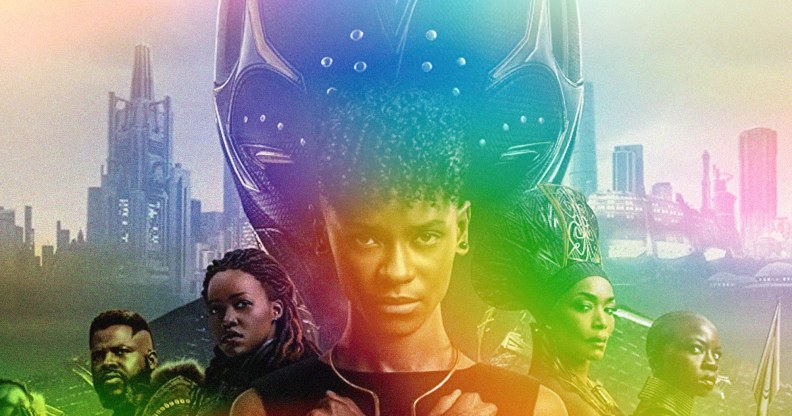Black Panther: Wakanda Forever queer plot revealed – and it’s not quite what we hoped for

Black Panther: Wakanda Forever features a blink-and-you’ll-miss-it queer romance. (Marvel)
Black Panther: Wakanda Forever‘s promised LGBTQ+ representation is reportedly lacking, with a queer kiss described as a “blink-and-you-miss-it” moment.
Early reviews of the Black Panther sequel have noted that despite actor Michaela Coel claiming the fact her character Aneka is queer “sold me on the role”, it doesn’t translate to the screen. Depictions of Aneka’s sexuality and relationship with Ayo (Florence Kasumba) are limited to a single kiss on the forehead.
Grace Randolph, who runs a YouTube channel called Beyond the Trailer, commented on the film’s queer representation, complimenting Coel’s performance but voicing disappointment at the depiction of Aneka’s sexuality.
“She’s [Coel] a wonderful actor but her role is quite small,” Randolph said in a video reviewing Black Panther: Wakanda Forever.
“To her credit though, she still is able to break through and make a strong impression.
“Unfortunately, her romance with Ayo… has been almost entirely cut out from the film except for a blink-and-you-miss-it kiss, but this time on the forehead”.
She added that the film could be accused of “queer-baiting”.
A Twitter user said of the film: “Great to see more expanded representation, but sheeesh the queer community really is just being given crumbs.”
In an interview with PA Media on Friday (4 November), Coel, who is British Ghanaian, explained that she hoped taking on the role of a queer character would have a positive impact in Ghana, where the LGBTQ+ community is still incredibly marginalised.
The I Will Destroy You actress said: “For me, it was about why I took the role and what it meant to me to portray a queer character, being from Ghana, where there’s a lot of confusing LGBTQ+ laws going on.
“My focus on that element was very singular… It was about what I represent in Ghana and putting my feet in the shoes of a queer character.”
She added that “by my being Ghanaian, Ghanaians will come”, and that she wanted to provide a positive LGBTQ+ portrayal for those in the country, where it is illegal to be gay.
“People say, ‘Oh, it’s fine, it’s just politics’… But I don’t think it is just politics when it affects how people get to live their daily lives,” she added.
“That’s why it felt important for me to step in and do that role because I know just by my being Ghanaian, Ghanaians will come.”
Disney and Marvel alike have both previously been criticised for promising queer storylines that fall a little flat in reality, with Disney’s first-ever LGBTQ+ character making just a one-line reference to her partner.
It faced criticism in 2019 when a promised same-sex kiss in Star Wars: Rise of Skywalker was between two background characters, and cut for release in several parts of the world.
This trend can also be spotted in the recent Thor: Love and Thunder, which director Taika Waititi claimed was “super gay” but contained little actual LGBTQ+ romance.

